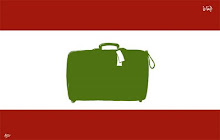
Published in Naharnet, Ya Libnan, and Beirut-Online
This summer was a remarkable one for Lebanon. Through prevailing peace and the return of many native sons and daughters, Lebanon seemed to be experiencing renaissance.
Behind this rebirth lies a sobering reality. As September drew to an end, most of the thousands of young expats that flocked to Lebanon for the summer left the country. Like me, the expat returns to his life in a land far away. Though envied by his compatriots at home for the generous opportunities in richer and more stable countries, this Lebanese silently suffers. His prize is economic opportunity. The cost, however, is separation from loved ones and from a place he calls home.
An estimated 20,000-40,000 Lebanese leave the country of 4 million every year. Most are students or young professionals seeking what Lebanon fails to offer: economic opportunities in a stable environment. A lot has been said about the effect of brain drain on the country, but few think about the plight of the emigrating youth. They too suffer as a result of their ambitions. Most would prefer to remain with loved ones, yet they end up aliens abroad.
For the young expat, the dilemma is painstakingly familiar: he sits at the airport waiting for a connecting flight to Europe or America, wondering whether he is committing a huge mistake. Is it worth leaving his people, his culture, and his family behind in search for opportunity? This is not his first time leaving home. In fact, he has been shuttling back and forth for many years now. Yet he cannot explain why his throat still throbs and why he has to fight back tears each time he leaves. Though surrounded by many, he is completely alone.
The emigrant's plight is a tale of schizophrenia. For years, he attempts to integrate into the new culture. Though he now shares experiences with his new cohort, he lacks a shared sense of identity. On many an occasion, he is reminded that he is an outsider, an alien. Meanwhile, as he acclimates to the norms of the host country, he becomes rusty with the customs of his native home. He has one foot abroad, one foot at home. Neither is enough to ground him anywhere. In essence, he becomes an outsider in both countries. That is the "dissociative" state of being torn between two places.
The irony is that the emigrant knows his clock is ticking. The longer he stays abroad, the harder it is for him to return home. The opportunity cost of leaving everything behind soars, and the risks rise. It becomes difficult to forego his professional standing, which he sacrificed so much to achieve, for an outcome that is uncertain. Lebanon's political instability clouds his opportunity for decent economic gain. He could accept a mediocre job or start something from scratch. The risk of failure, however, is high as dictated by a fragile and primitive business environment. There is also no guarantee that his experience abroad will be of any use at home. Lebanon thus becomes a bittersweet memory, an ache in his heart.
The emigrant's struggles are further exacerbated by the stigma of carrying the Lebanese passport. In the new world order defined by the events of September 11, the Lebanese migrant is less than welcomed by custom officials in Western countries. In American airports, he is labeled "special registrant," which entails additional searches, longer waits, and inquisitive cross examinations by unwelcoming and sometimes disrespectful officers. As the West evaluates its immigration policies, the Lebanese emigrant continues to struggle to find a new home in lands that seem to no longer welcome him.
Who is to blame for the struggles of the young emigrant? The home country for creating the conditions for emigration? Globalization for making the process easier? Or the emigrant's own ambitions for wanting what was not offered at home?
While the answer is probably a combination of all three, this reality, ultimately, is a plea to our politicians. In the new rounds of negotiations, may they genuinely attempt to form a government that maintains a seeming perception of political stability. The slightest efforts in that direction could create economic opportunities that obliterate much of the conditions for emigration and encourage émigrés to return. May their conscience remind them that young souls the age of their sons and daughters are being forced to leave their loved ones every day. They are the foregone future leaders that Lebanon so desperately needs. Their struggle is the country's struggle. Their loss of a homeland is the country's loss of its future.
